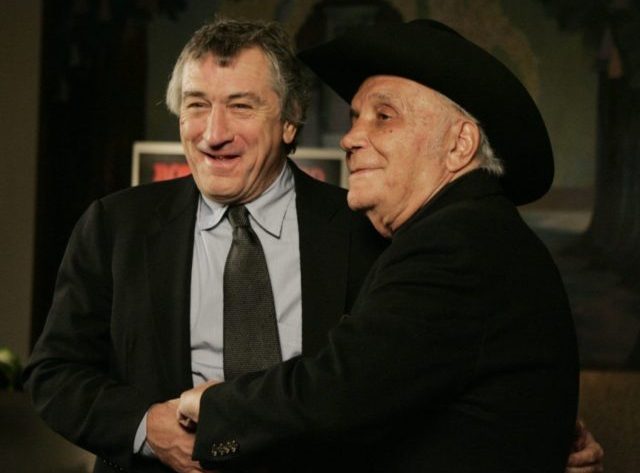Jake LaMotta, famously never knocked down in six brutal bouts with Sugar Ray Robinson, fell from pneumonia on Tuesday. He lived 95 interesting years.
And during that near-century of existence, LaMotta wore the middleweight crown and the shame of fixing a fight, acted in movies before watching one of the world’s great actors play him, married seven times and divorced six, lived in luxury and the penitentiary, and earned his keep as a barkeep, comedian, author, and much else.
LaMotta, whose swarming style and iron chin helped him wear down opponents, won the middleweight championship in 1949 by defeating Frenchman Marcel Cerdan, who died in a plane crash just before the sequel. A rematch of sorts occurred with the second-best French middleweight export, Laurent Dauthuille, who battered LaMotta before the Bronx Bull dramatically snatched victory from the jaws of defeat by knocking his opponent out with thirteen second left in the fifteenth and final round. Ring magazine named the battle 1950’s “Fight of the Year.”
But sports fans remember LaMotta primarily for his one-sided rivalry with Sugar Ray Robinson, arguably the greatest boxer to ever lace up a glove. From October 2, 1942 to Valentine’s Day 1951, the pair fought 65 punishing rounds. LaMotta handed Robinson his first professional defeat in 1943. Despite putting down the smaller, quicker man three times in their sweet science saga, the bigger, stronger man dropped four of the five closely-contested battles before enduring a beating in their sixth and final fight.
Perhaps more so than those actual fights, Americans recall their silver-screen depictions of them in Martin Scorsese’s black-and-white classic, Raging Bull, dubbed the best film of the 1980s by both Gene Siskel and Roger Ebert. Therein, Robert DeNiro, in training to become a chiseled boxer by purportedly sparring over a thousand rounds with LaMotta and then gaining 75 pounds by eating as a retired boxer, defined himself as an actor and LaMotta as a man. He portrayed the middleweight as a creature consumed by his appetites. The married LaMotta covets a 15-year-old girl swimming at the neighborhood pool enough that he divorces his wife to marry her. When Vikki LaMotta burns his steak, Jake turns into the intergender boxing champion of the world. He achieves great glory by winning the lineal middleweight belt but does so only after throwing a bout against Billy Fox to satiate boxing’s organized-crime overlords. After boxing, the puncher becomes a punchline by becoming a nightclub comedian. DeNiro’s LaMotta comes across as a vicious, pathetic, sympathetic, and heroic figure. While the mob, marriage, and the law knocked down the complex character in the movie, he reminds his great rival: “You never got me down, Ray.”
And only one fighter delivered a legitimate knockdown on the Bronx Bull. Despite enduring an amazing amount of punishment in a punishing sport, La Motta appeared undamaged, lucid, and quick in his later years unlike so many other greats, including his old nemesis Sugar Ray Robinson. Life knocked him down but never kept him down.
“You’ve got to have determination,” an aging LaMotta reflected on his success as a boxer that also worked as an answer to how he managed to come back in life. “You’ve got to have will power. You have to have positive thinking. You’ve got to believe, believe, believe, believe.”

COMMENTS
Please let us know if you're having issues with commenting.